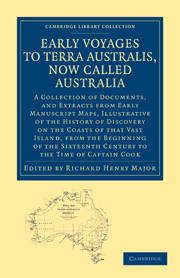 Early Voyages to Terra Australis, Now Called Australia
Early Voyages to Terra Australis, Now Called Australia Published online by Cambridge University Press: 05 February 2013
Having fair weather, and the winds hanging southerly, I jog'd on to the eastward to make the Cape. On the third of June we saw a sail to leeward of us, shewing English colours. I bare away to speak with her, and found her to be the Antelope, of London, commanded by Captain Hammond, and bound for the Bay of Bengal, in the service of the New East India Company. There were many passengers aboard, going to settle there under Sir Edward Littleton, who was going chief thither: I went aboard, and was known by Sir Edward and Mr. Hedges, and kindly received and treated by them and the commander, who had been afraid of us before, though I had sent one of my officers aboard. They had been in at the Cape, and came from thence the day before, having stock'd themselves with refreshments. They told me that they were by reckoning sixty miles to the west of the Cape. While I was aboard them, a fine small westerly wind sprang up; therefore I shortned my stay with them, because I did not design to go into the Cape. When I took leave I was presented with half a mutton, twelve cabbages, twelve pumpkins, six pound of butter, six couple of stock-fish, and a quantity of parsnips; sending them some oatmeal, which they wanted.
From my first setting out from England I did not design to touch at the Cape, and that was one reason why I touch'd at Brazil, that there I might refresh my men, and prepare them for a long run to New Holland.
To save this book to your Kindle, first ensure [email protected] is added to your Approved Personal Document E-mail List under your Personal Document Settings on the Manage Your Content and Devices page of your Amazon account. Then enter the ‘name’ part of your Kindle email address below. Find out more about saving to your Kindle.
Note you can select to save to either the @free.kindle.com or @kindle.com variations. ‘@free.kindle.com’ emails are free but can only be saved to your device when it is connected to wi-fi. ‘@kindle.com’ emails can be delivered even when you are not connected to wi-fi, but note that service fees apply.
Find out more about the Kindle Personal Document Service.
To save content items to your account, please confirm that you agree to abide by our usage policies. If this is the first time you use this feature, you will be asked to authorise Cambridge Core to connect with your account. Find out more about saving content to Dropbox.
To save content items to your account, please confirm that you agree to abide by our usage policies. If this is the first time you use this feature, you will be asked to authorise Cambridge Core to connect with your account. Find out more about saving content to Google Drive.